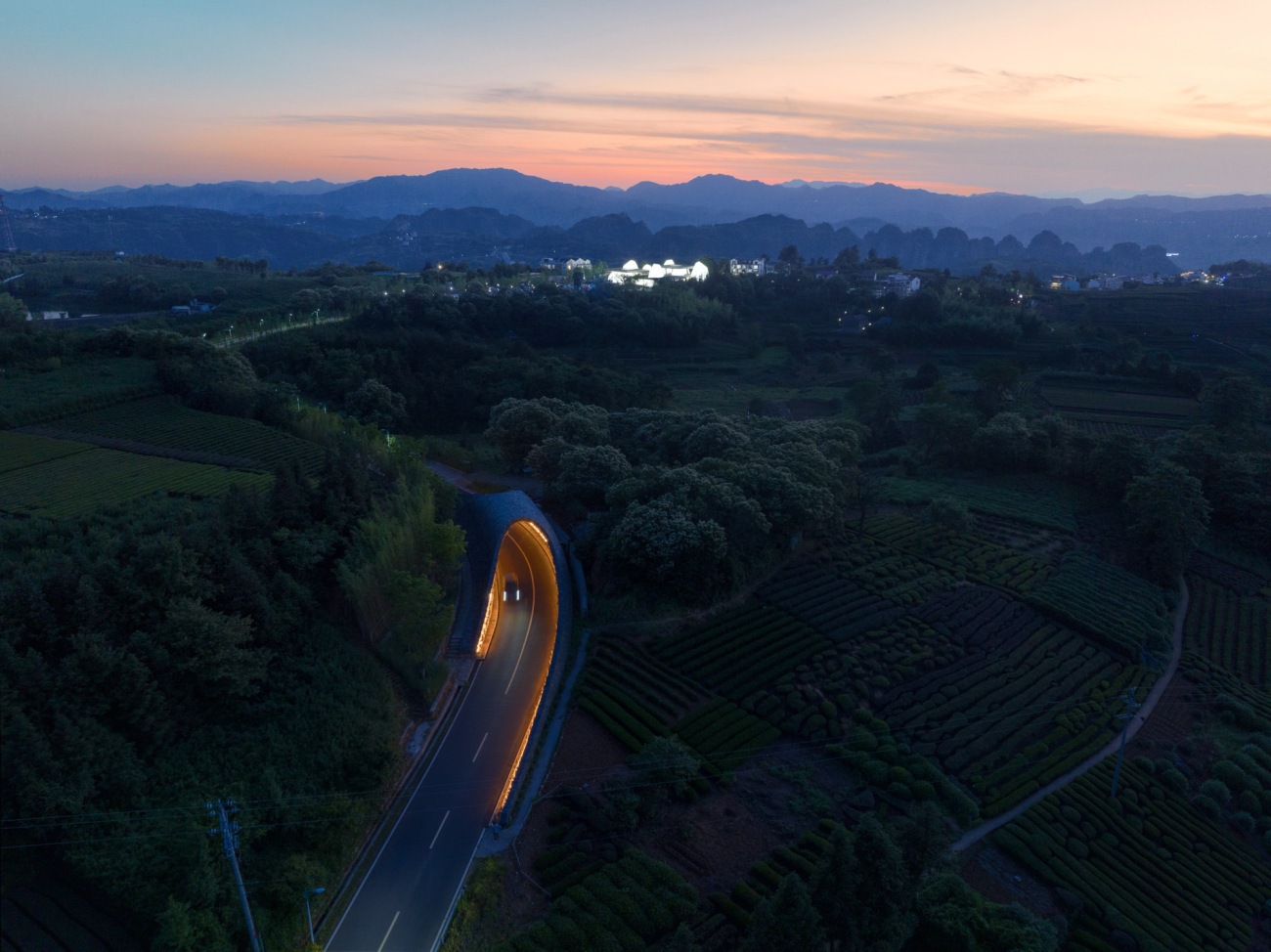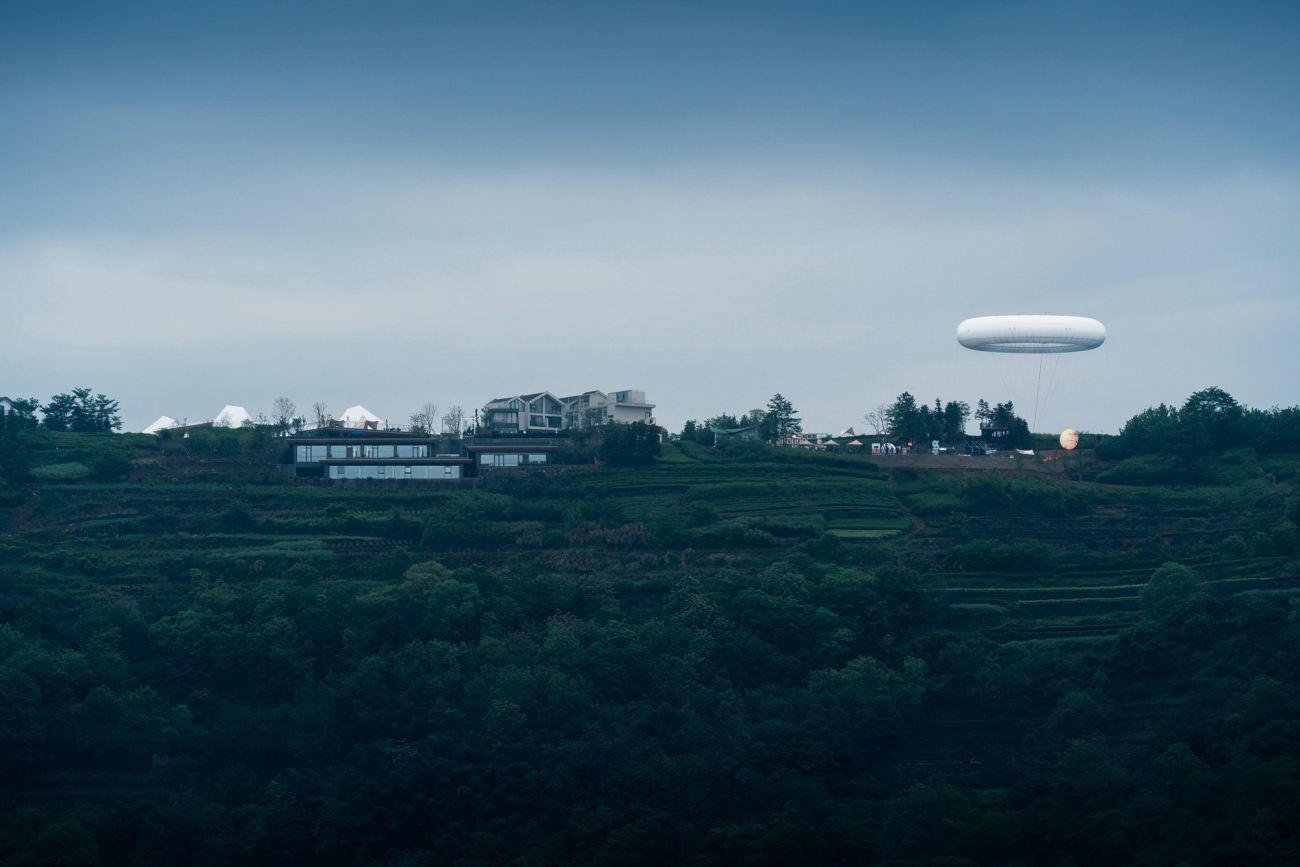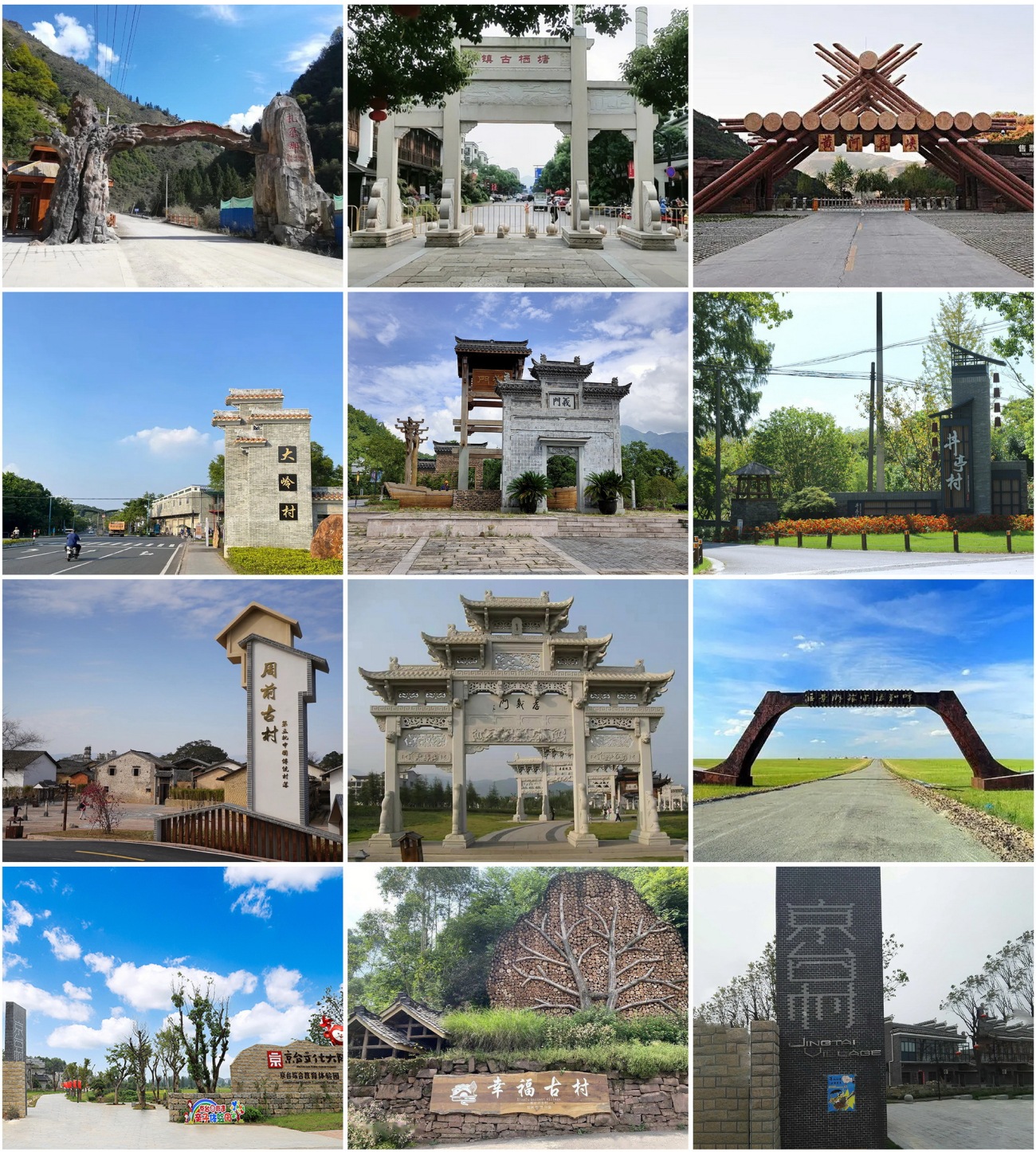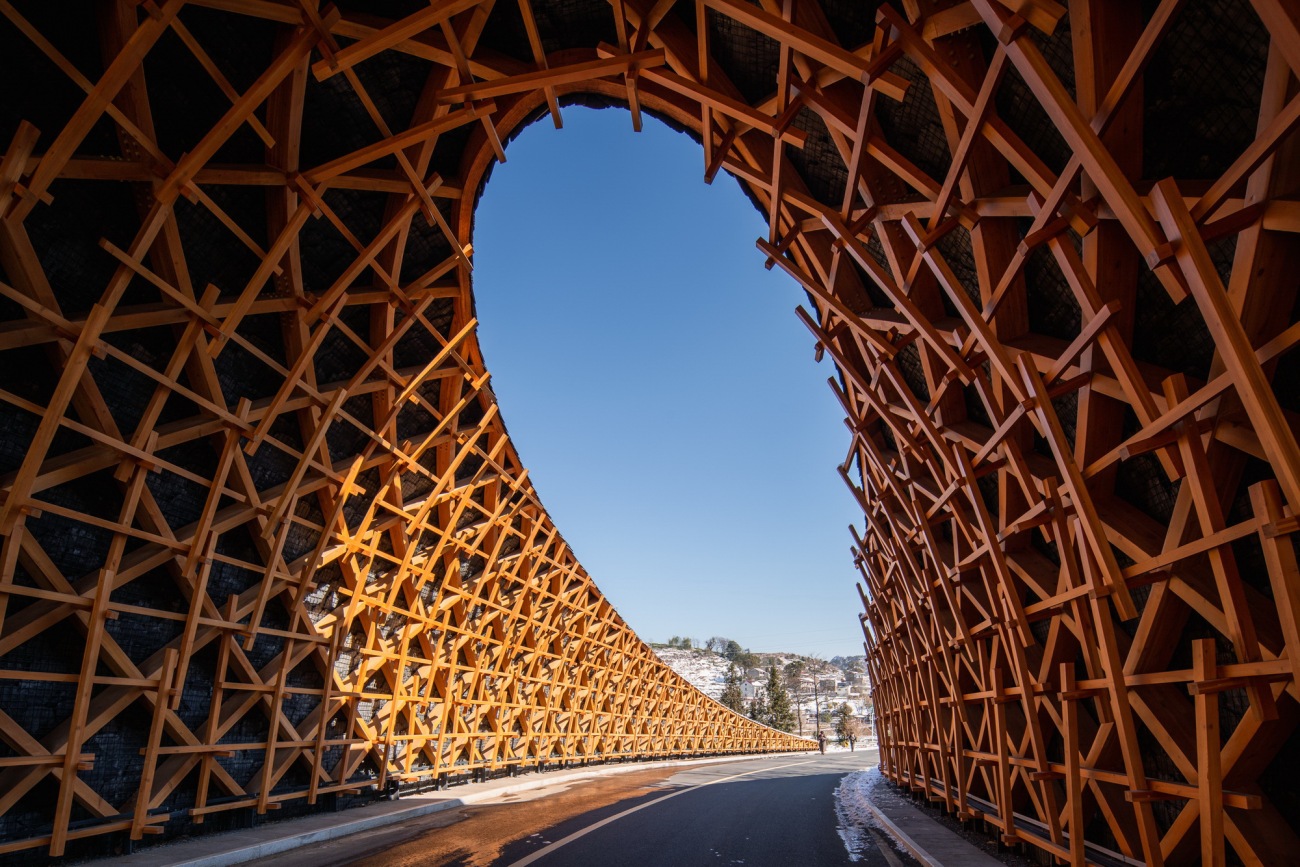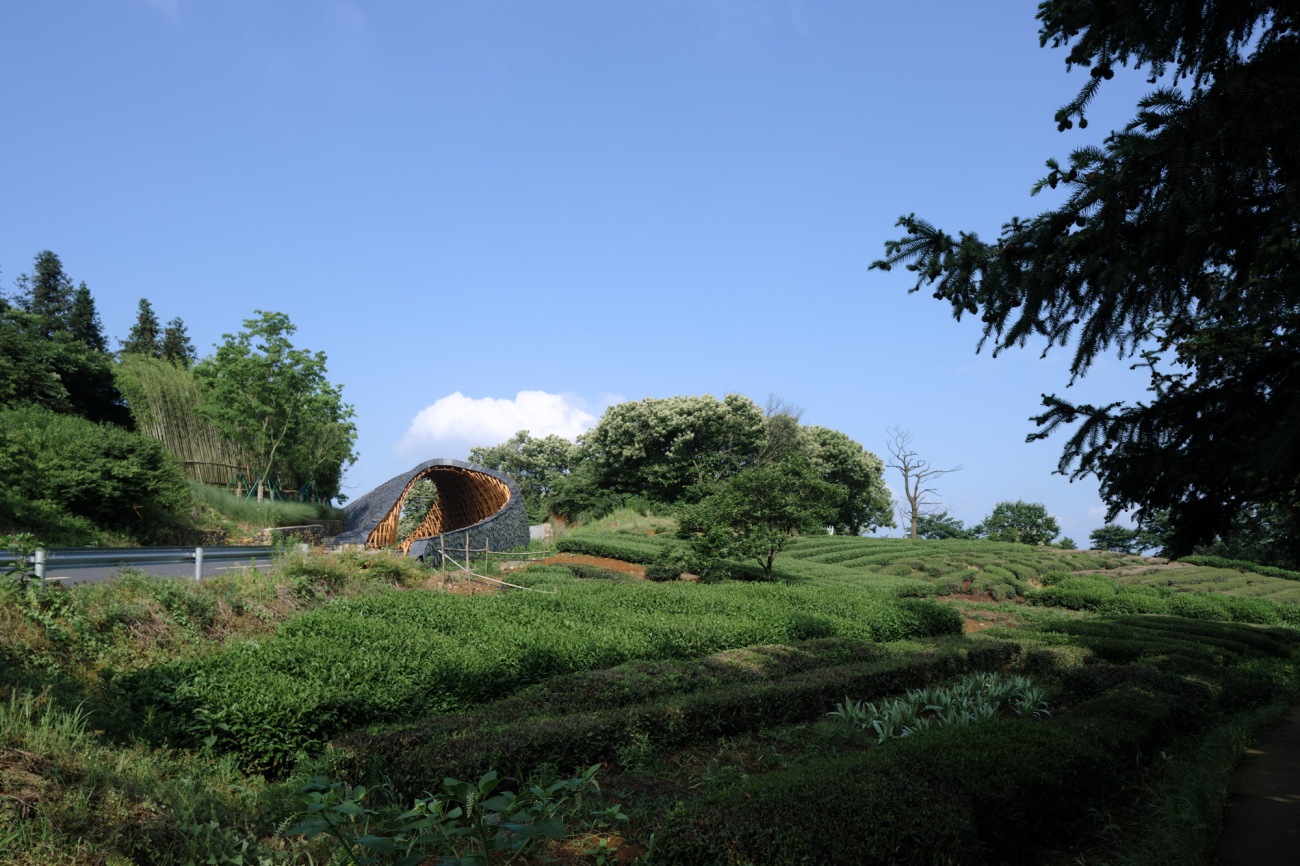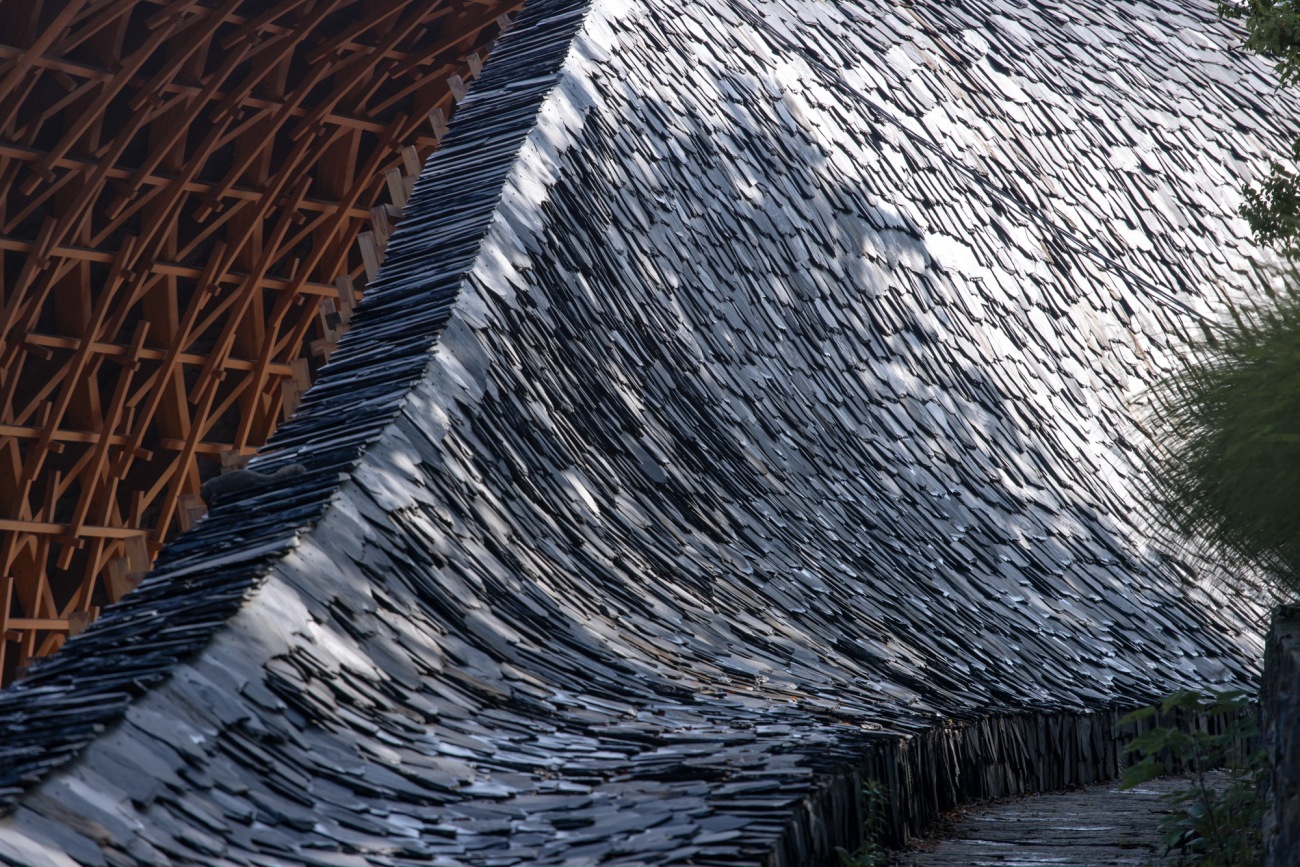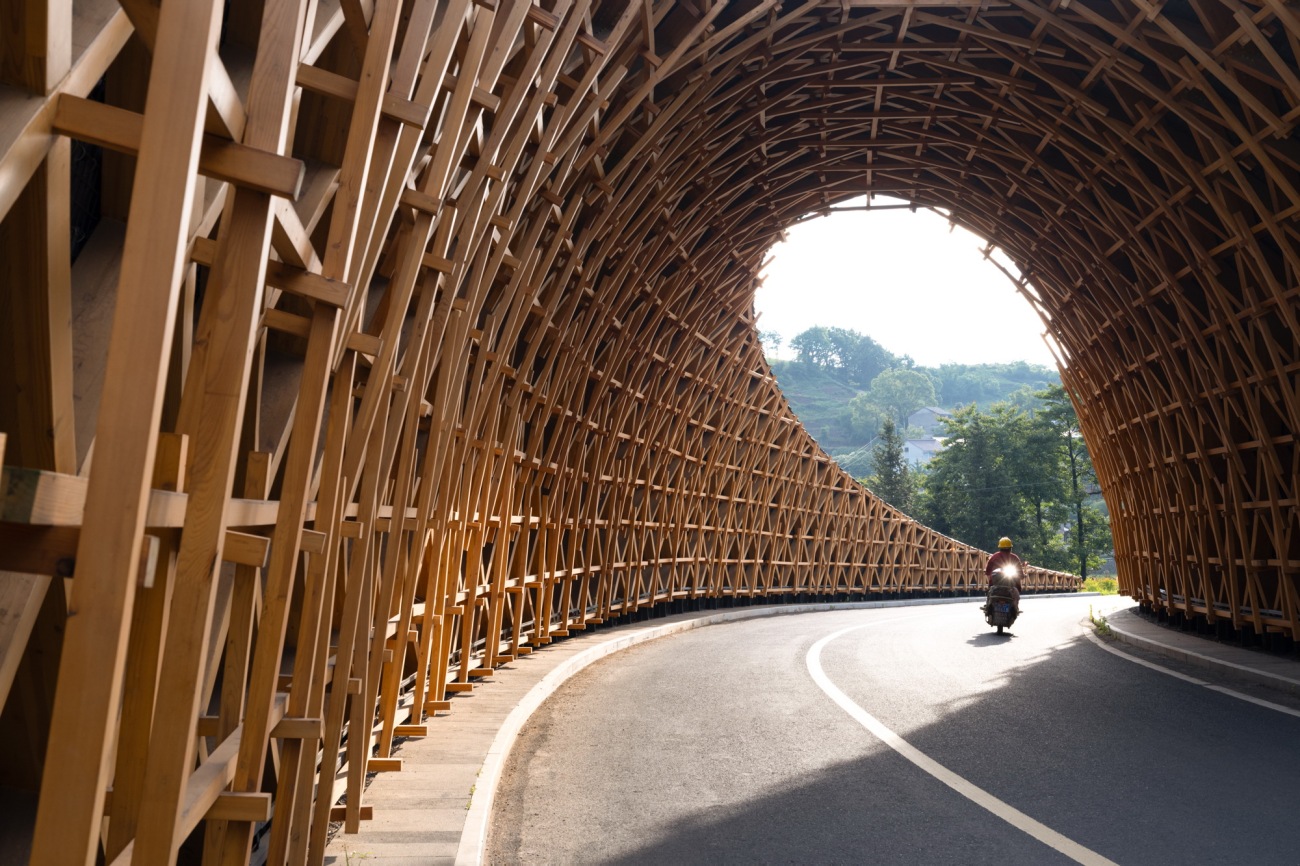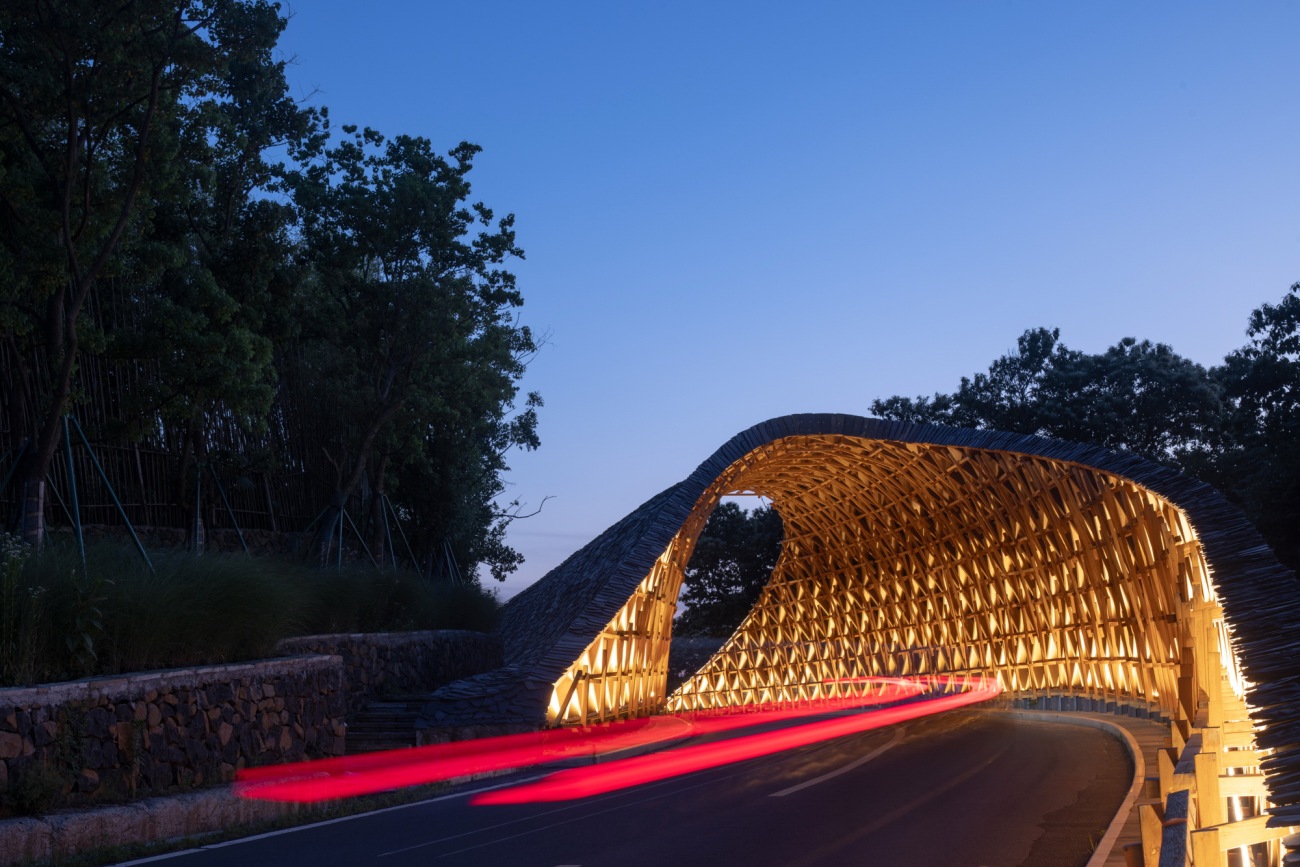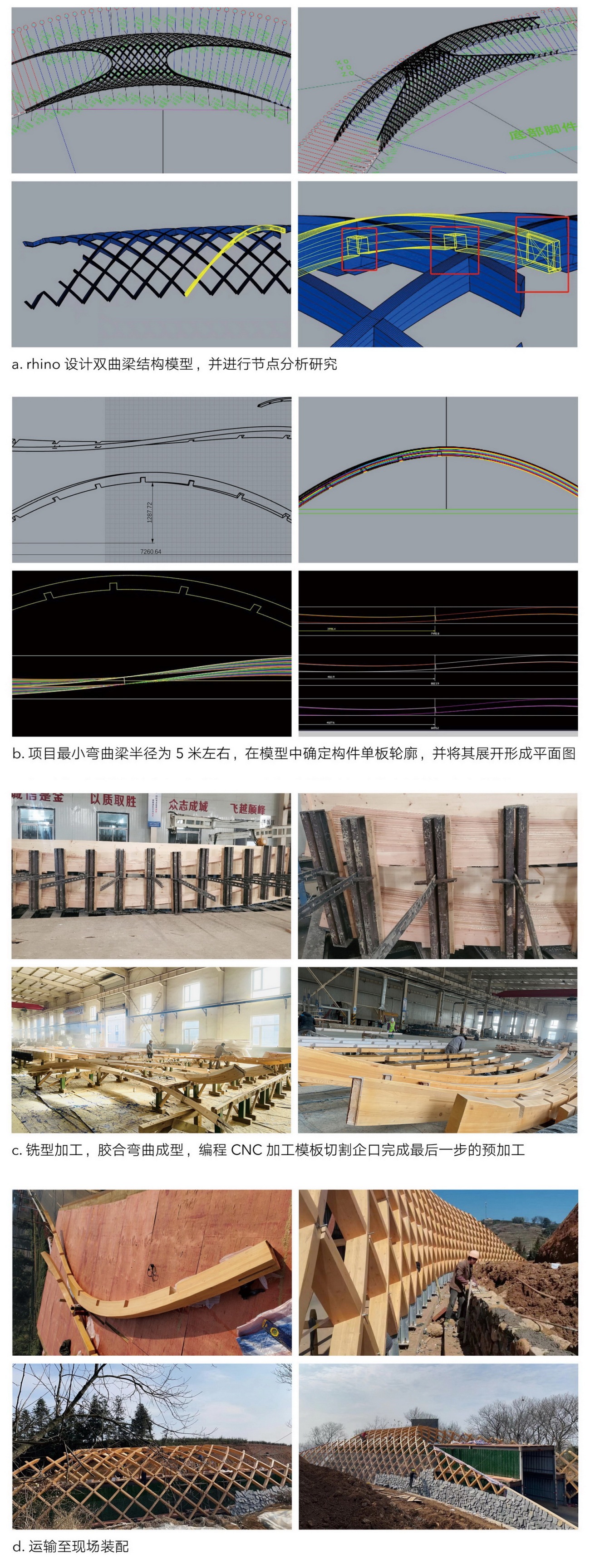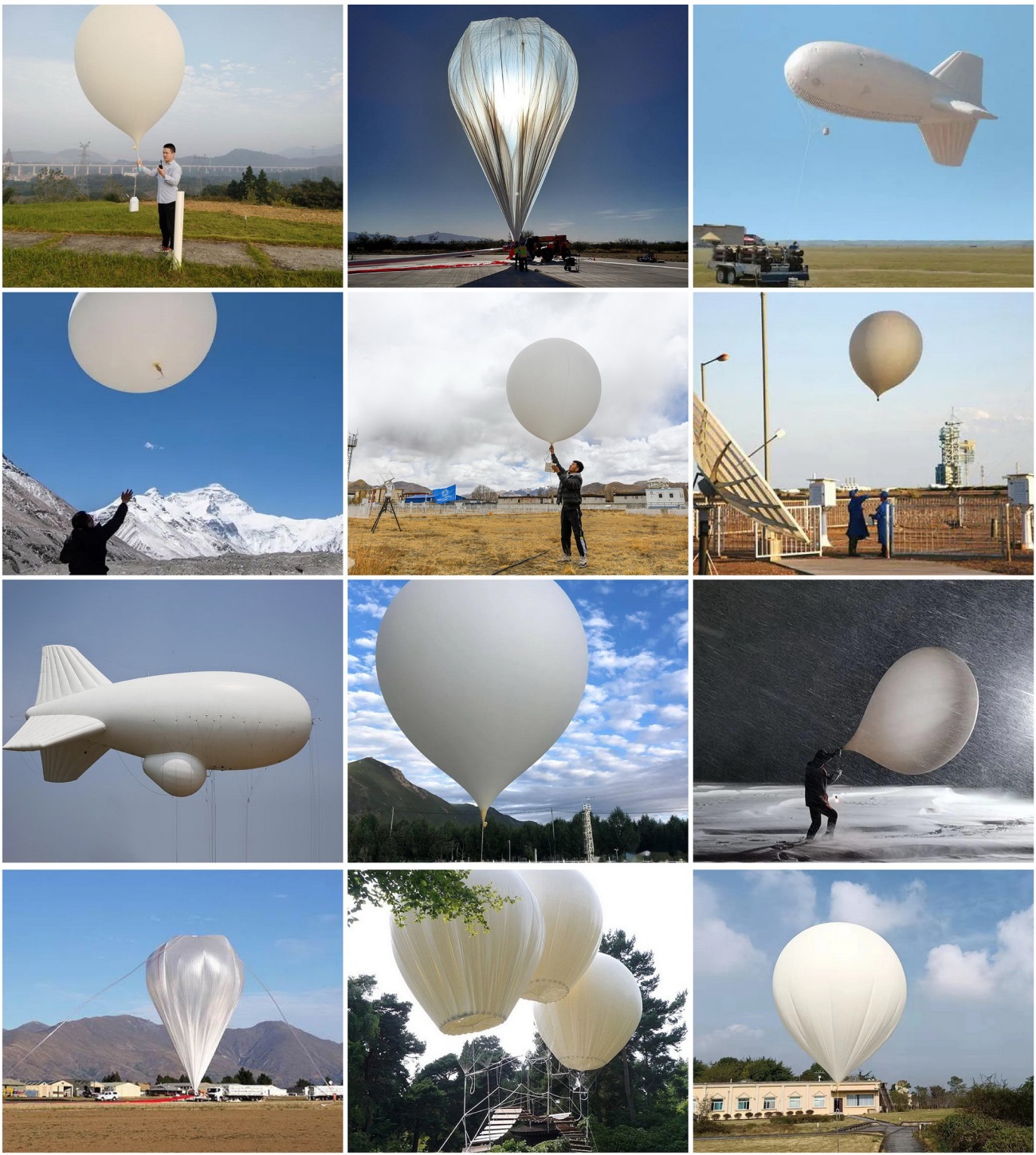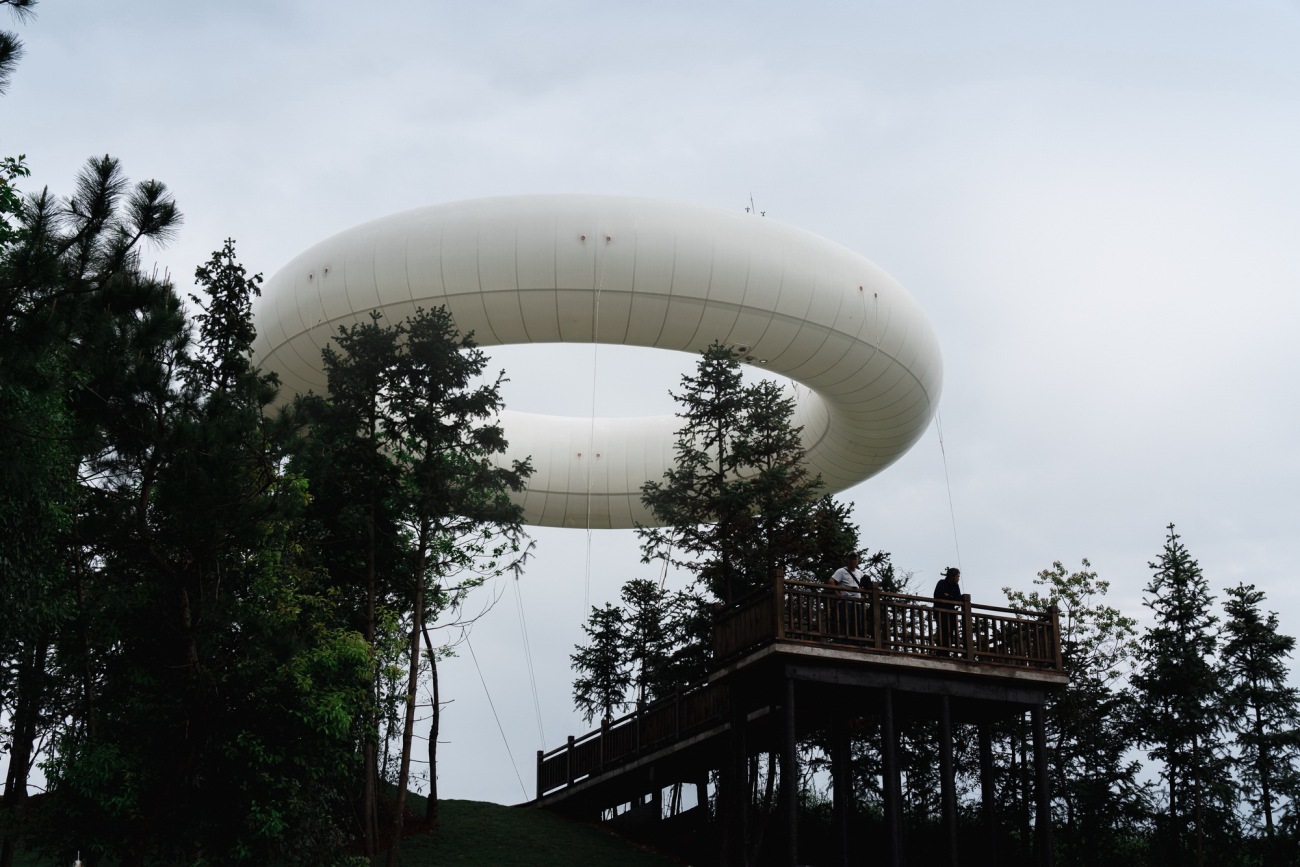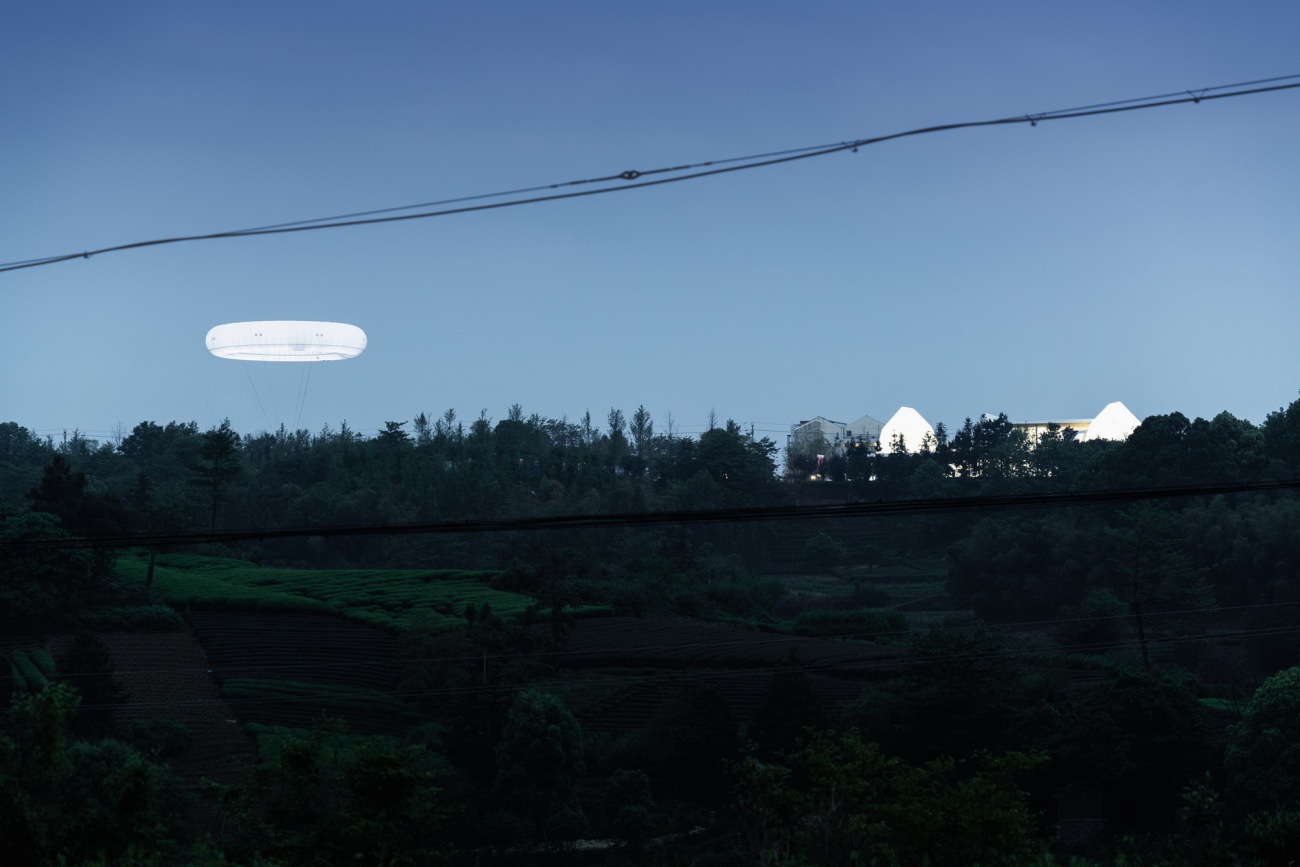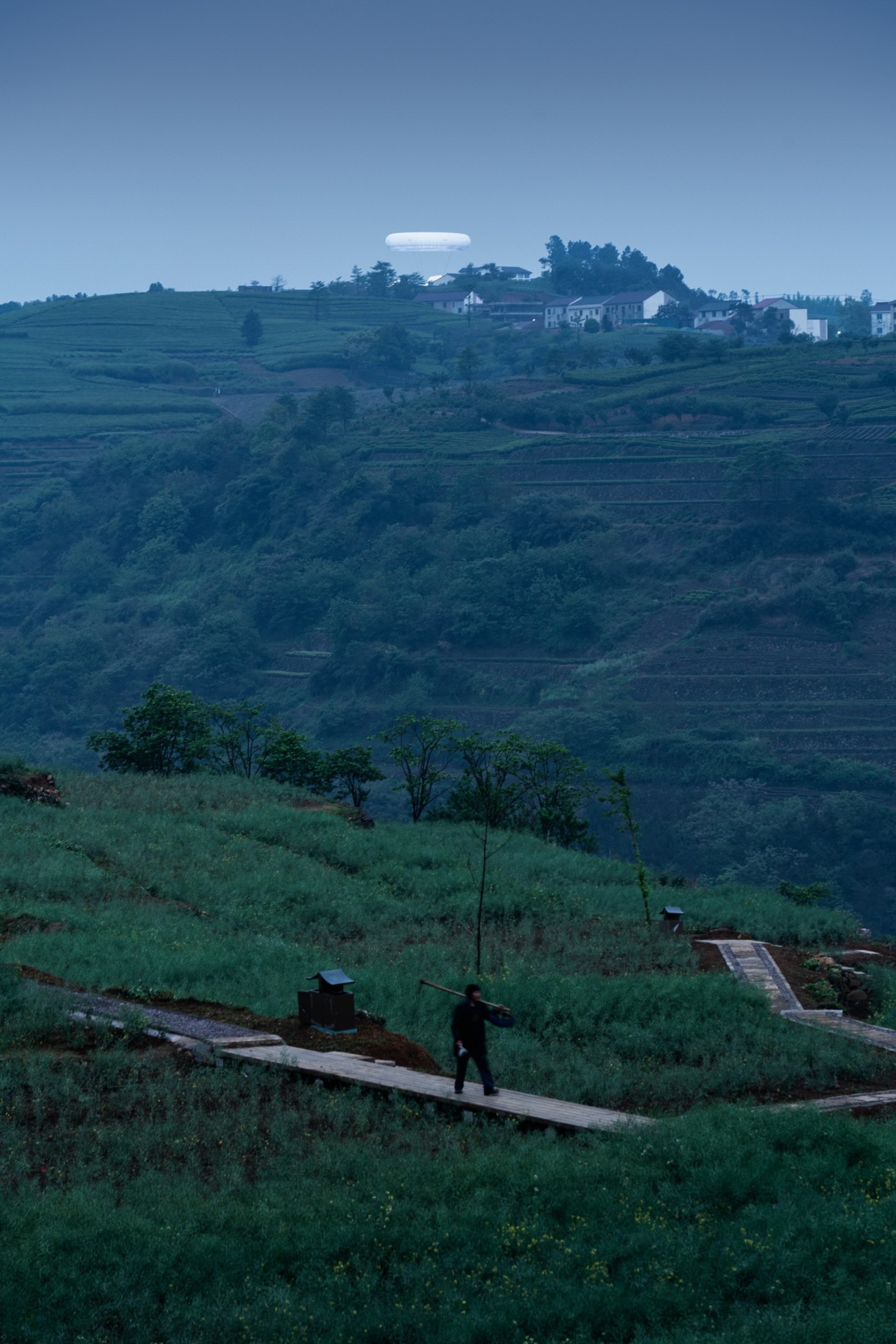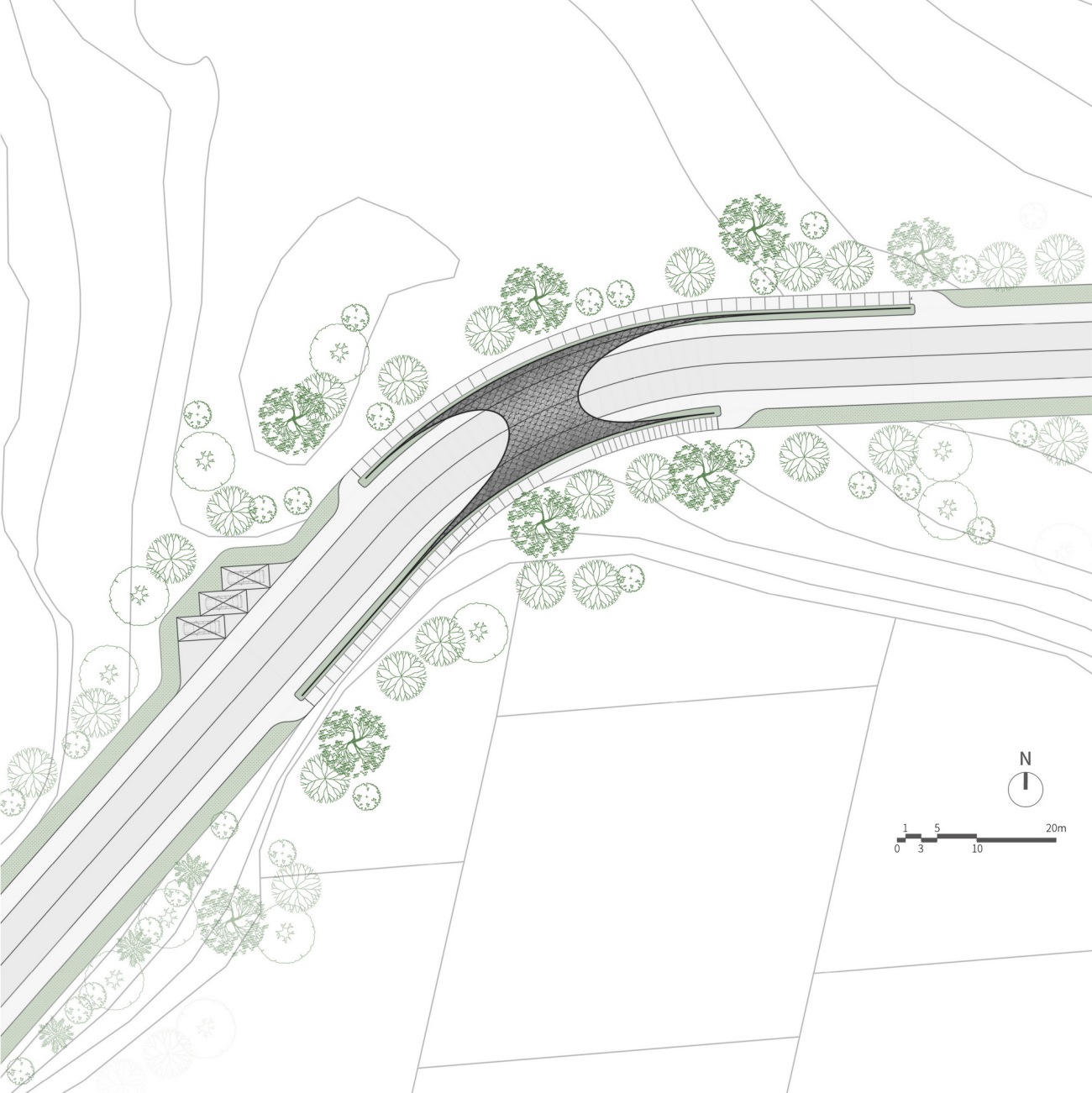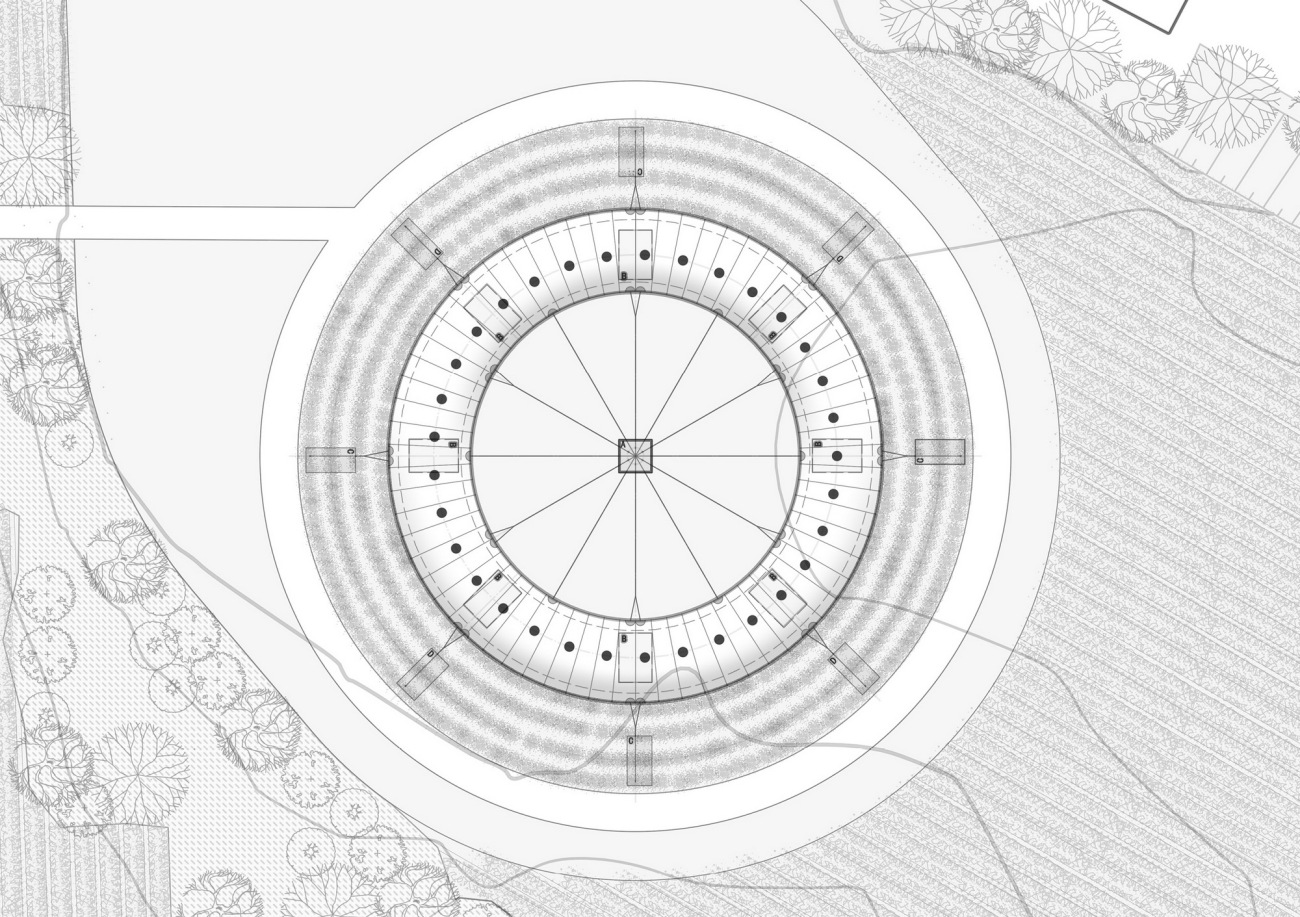| 公司: | line+建筑事务所 | 类型: | 建筑 | 艺术 |
|---|---|---|---|
| 地区: | 中国 | 标签: | 艺术装置 |
“乡村景区的激活和发展,既需要因地制宜地锚固于历史底蕴与自然风景,同时也应面向未来地植入极具差异的想象与活力。”
——朱培栋
"Revitalizing and developing rural scenic areas requires a foundation in historical heritage and natural landscapes, while also embracing bold, future-oriented imagination and vitality."
— Zhu Peidong
新昌下岩贝村建于浙东山脊之上、十九峰景区之中,常年云雾氤氲,仙气缭绕。置身于山脊云海,与李白曾在新昌写下的《梦游天姥吟留别》“越人语天姥,云霞明灭或可睹。天姥连天向天横,势拔五岳掩赤城”的意境如出一辙。因雨后云海壮观,又与“十九峰”丹霞地貌奇景交相对望,下岩贝村陆续吸引了户外运动爱好者前往露营打卡,也因此发展为当下热门的户外旅行目的地。然而近年来,因乡村自身条件所限,固有的配套设施不足、接待承载能力薄弱等问题也日益突显,景区发展后劲不足。
Perched on the ridge of Xinchang in eastern Zhejiang, within the 19 Peaks Scenic Area, Xiayanbei Village is shrouded in mist and clouds year-round, creating a mystical atmosphere. This setting mirrors the imagery in Li Bai’s poem, 'The Song of Wandering the Sky at Mount Tianmu,' where clouds and mists obscure the peaks. The village, overlooking a sea of clouds and set against the Danxia landforms of 19 Peaks, has become a favored destination for outdoor enthusiasts. However, in recent years, the village's limited infrastructure and inadequate visitor capacity have increasingly hindered its sustainable development.
line+联合创始人、主持建筑师朱培栋受邀介入下岩贝景区的提升改造工程。在多次的实地踏勘和调研后,两方面的挑战跃然而出:一是如何回应乡村建设发展的普遍困难,如建设资金不足、土地指标紧缺、业态定位趋同等;二是如何打造乡村景区作为当代旅游目的地的独特魅力。
Invited to lead the enhancement of Xiayanbei's scenic area, Zhu Peidong, Co-Founder and Chief Architect of line+ studio, confronted two major challenges: addressing the typical obstacles of rural development, such as funding shortages, land scarcity, and business model homogeneity; and crafting a distinctive identity for Xiayanbei as a modern tourist destination.
因此,设计团队采取了两条并行的策略予以回应:一方面,通过前置的策划与慎重的择址,以不占用任何新增土地指标的基础设施作为突破口,进行差异化设计,创造体验风景的新场景;另一方面则是通过对存量土地与空间的更新再利用,结合运营前置、复合设计,借助引入新的业态和流量来完善景区配套,既服务外来游客,也造福当地村民。
In response, the design team employed a dual strategy: first, through careful pre-planning and site selection, leveraging existing infrastructure without requiring additional land quotas to create differentiated scenic experiences; second, by revitalizing existing land and spaces, integrating operational planning with composite design. This approach aimed to enhance infrastructure, benefiting both visitors and local residents by introducing new business models and increasing foot traffic.
△总平面图Site Plan
“穿云编木隧”和“腾云气象环”是下岩贝景区提升工程中的首期启动项目,也是新增的基础设施。根据所处的场地条件和风景关系,设计采用了在地化(入地)和差异化(上天)两种截然不同的设计策略,分别作为项目需求中的景区入口和超级IP。
The 'Woven Passage to Cloudy Peaks' and 'Sky Ring' are the initial projects in the enhancement of the Xiayanbei scenic area, introducing new infrastructure. These installations follow two distinct design strategies—'grounded' and 'elevated'—tailored to site conditions and landscape context, serving as the entrance and iconic landmarks of the area.
在呈现差异策略的背后,是两者均以下岩贝村落所特有的文脉底蕴和自然风景为背景,通过设计和建造,创造差异化的知觉体验,并在访客旅游观光的体验叙事上形成渐进的连续性,也为在地生活的村民构筑更具新鲜感的日常。
Rooted in Xiayanbei's cultural heritage and natural landscape, these strategies create unique sensory experiences through design and construction, establishing a cohesive narrative for visitors while enriching the daily life of local residents.
01
记忆与技艺:穿云编木隧
Memory and Craftsmanship: Woven Passage to Cloudy Peaks
下岩贝的村口,没有界碑,也没有门廊或牌坊,作为一处新的目的地,它缺乏明显的景区标识和村内外的过渡缓冲。项目启动时,来自业主方的首要诉求是在村口合适的位置设置一处景区常见的大门。通过对场地的踏勘,我们将这一朴实而直接的需求,结合现场实际地形,提出了关于入口的另一种新可能:将大门转换为一种更具记忆度的进入与到达的体验——一条进入村庄和景区的隧道。
The village entrance lacks a traditional boundary marker, gateway, or arch, leaving it without clear signage or transitional buffers. As a new destination, the client initially requested a standard gateway. However, after site evaluation, an alternative was proposed: transforming the gateway into a more memorable entry experience—a woven passage leading into the village and scenic area.
△场地原貌Original State of The Site
△传统景区大门Traditional Scenic Gateway
△穿云编木隧Woven Passage to Cloudy Peaks
我们选择在连接后岱山村和下岩贝村的村道拐弯处设计了一段隧道构筑物,从而将景区的门牌坐标差异化地转为一段由穿行带来的独特记忆——近村入景,穿行须臾间,云海茶田映入眼帘。
A passage was designed at the bend of the road between Houdaisan Village and Xiayanbei Village, turning the entrance signage into a distinctive experience. As one passes through, the sea of clouds and tea fields suddenly unfold before the eyes.
| 生态修复,可持续建造
| Ecological Restoration and Sustainability
在现场踏勘时,设计团队发现,早年因为修建村道,两村之间的原有的自然山体被一分为二,道路从中穿过,两侧植被凋敝,黄土裸露,雨后时常淤塞道路。2018-19年景区初建时曾单边设置了简易混凝土挡土墙,防止土块掉落,但江南之多雨仍使得裸露的黄土在持续地流失。
During the site survey, the design team observed that the village road construction years ago had split the natural hill between the two villages, leading to severe vegetation erosion and exposed soil, which frequently caused road blockages after rain. In 2018-2019, a simple concrete retaining wall was installed to mitigate soil erosion, but the persistent rainfall in Jiangnan continued to exacerbate soil loss.
△场地分析Site Analysis
因而于此择址的隧道,除了建立入口标识和体验的设计初衷外,更尝试从环境生态修复的角度切入,替代原有的简易挡土墙,弥合原始自然土丘的创口,使得这一交通坐标亦有机会扮演修复生态基地的基础设施这一角色。
The passage was designed not only to establish an entrance marker and create a memorable experience but also to contribute to ecological restoration. By replacing the original retaining wall and repairing the disruption to the natural hillside, the passage serves a dual purpose as a transportation landmark and as a critical component of the site's ecological restoration infrastructure.
隧道在保证大巴和工程车辆通行的交通规范高度基础上,外部尺度尽可能贴合原有山坡切口的顶标高,顺应顺应地势变化,结合整体设计的叠级景观挡墙,对原生边坡进行衔接与填补,并以亲自然的形式和材料实现可持续建造。
The passage’s height is engineered to comply with transportation standards for buses and construction vehicles, while its external dimensions closely follow the original elevation of the hillside cut. This alignment ensures the structure naturally integrates with the terrain's contours. The design also incorporates tiered landscape retaining walls to seamlessly connect and stabilize the original slopes, employing natural forms and materials to achieve sustainable construction.
新昌一带传统手工业积淀深厚,素有竹编产业著名,并被列入当地非遗名录。受其竹编工艺启发,建筑师在隧道内部结构选择了亲自然的木材来作为隧道的主支撑结构,通过源于新昌当地竹编工艺在木构材料上的发展应用,木构受力组件通过结构装饰一体化的整体设计,从而以隧道空间自身的结构形式作为视觉的张力来源,并以新的形式传承和发展在地的手工文化记忆。
Xinchang is known for its rich tradition of bamboo weaving, a craft recognized as part of the region's intangible cultural heritage. Inspired by this, the architects chose natural wood as the primary structural material for the passage's interior. The integration of bamboo weaving techniques into the wooden framework allowed the load-bearing components to serve both structural and decorative purposes. This design approach not only creates visual tension within the woven passage but also revitalizes and preserves local craftsmanship in a contemporary form.
△当地传统非遗竹编工艺与现代木构The traditional craft of bamboo weaving, recognized as intangible cultural heritage, is seamlessly integrated with modern timber construction.
△结构爆炸图Exploded Axonometric Diagram
隧道的外表皮则选用当地常见的玄色自然片岩,使得整个体量能够和谐地隐匿于茶田树林间,成为山体的一部分,融入环境。
The exterior is clad in locally sourced black slate, enabling the structure to blend seamlessly into the surrounding tea fields and forest, becoming a natural extension of the landscape.
隧道的体量经曲线柔化后依附于山体,流畅的双曲面结构,在转折行径中控制视线收放,制造了明暗变奏的“穿越”张力。“林尽水源,便得一山,山有小口,仿佛若有光……复行数十步,豁然开朗”的空间体验在仅二十米的隧道内得以复现。
The form, softened by curves, closely adheres to the mountainside. The fluid double-curved structure guides the eye through a controlled interplay of light and shadow, creating a tension that evokes the sensation of 'passing through.' This mirrors the spatial narrative in Tao Yuanming's 'Peach Blossom Spring,' where a narrow path opens into a broad, illuminated space. This experience is recreated within the woven passage’s twenty meters, offering a moment of revelation and transformation.
| 复杂曲面的结构一体化设计
| Complex Curved Surface Design
双曲面木结构的设计难点在于几何形状和材料应力的对应关系。建筑师携手栾栌构造设计事务所共同协作,在常规胶合木结构模型的双曲旋转方向上进行截面扭转,并采用多种包络设计尝试,分别对胶合木胶缝剪切强度、胶合木杆件抗扭转、胶合木反弯点节点进行验算,以保证薄弱环节均被覆盖,从而使这一木构承重的复杂曲面隧道在图面上得以成立。
The challenge in designing the double-curved wooden structure lies in aligning geometric shape with material stress. Collaborating with Luanlu Structural Design Firm, calculations were made for shear strength, torsional resistance, and critical bending points of the laminated timber to reinforce all weak areas. This rigorous process ensured the structural viability of the complex load-bearing passage.
△双曲胶合木梁设计过程Design Process of Double-Curved Glulam Beams
| 高效精准的装配式建造系统
| Precision Prefabrication System
从图面到现场,工艺的选择和施工的组织至关重要。在设计深化中,建筑师、结构师和加工厂家,通过rhino—revit的参数化设计还原实际加工时双曲梁的结构模型及每一个节点的构造,从而确定加工时每一根构件的曲率和位置,并根据弯曲半径和厚度选择最合适的13mm厚花旗松进行建造。在模型中首先确定构件单板轮廓,并将其展开获得平面图;通过铣型加工,胶合弯曲成型。编程CNC加工模板切割企口完成最后一步的预加工,运输至现场装配。
Transitioning from design to construction required meticulous planning and precise coordination. During design development, parametric software like Rhino-Revit was employed to model the double-curved beams and nodes, ensuring accurate curvature and positioning. The optimal 13mm Douglas fir was selected based on the required bending radius and thickness. Components were then CNC-machined, pre-assembled, and transported to the site for final assembly.
△施工过程Construction Process
△墙身剖面节点Wall Section Detail
△两种材料安装细节Installation Details of Two Materials
木结构框架搭建完成后,在其外表面覆盖不锈钢金属网,用镀锌方钢龙骨固定,自然断裂岩板由金属丝穿洞固定。来自地方工匠手工装的方式则为厂家预制的装配式结构在精确性之上,增添了不规则岩板所特有的那种粗粝的自然质感。
After the wooden framework was completed, it was clad with stainless steel mesh, secured by galvanized steel ribs, and natural fracture stone slabs were fastened with metal wires. The irregular texture of the slabs, handcrafted by local artisans, added a raw, natural quality to the prefabricated structure.
△木结构加工及施工过程Timber Fabrication and Construction Process
02
差异的标识:腾云气象环
Distinctive Landmark: Sky Ring
下岩贝村的主要活动,观山云海、露营徒步、农事耕作等都极其依赖天气气象。一方面“腾云气象环”便是以“气象”为母题创作的下岩贝IP装置,除了形式自带的视觉标识作用之外,它也承担了景区气象气球的职能,通过肉眼可及的是否腾空,以及后台的数据采集,为村民和游客提供多层次的天气预告。
Xiayanbei Village’s main activities—mountain viewing, cloud watching, camping, hiking, and farming—are all heavily weather-dependent. The 'Sky Ring,' an IP installation themed around meteorology, not only serves as a visual landmark but also functions as a meteorological balloon, providing multi-layered weather forecasts for villagers and tourists through its visible ascent and data collection.
另一方面,我们希望气象环能够跳脱出人们习以为常的气象气球的常态,在实现气象数据的记录和采集的同时,也有机会成为下岩贝的某种新的公共性的象征——不仅是在数公里外即可识别的超级IP标识,当它腾空时,其投影下的地面场域也是为游客和村民提供一处共享的活动空间。
The goal was to go beyond the conventional meteorological balloon, making the Sky Ring a new public symbol for Xiayanbei. When inflated, it becomes a landmark visible from miles away and creates a shared space for tourists and villagers beneath its shadow.
△常规气象气球Conventional Weather Balloon
△腾云气象环Sky Ring
因而在选址时,建筑师重点考虑了其可达性,易于人员聚集停留,有相对独立完整平坦,利于气球收放。因此,设计将其规划安置于毗邻停车场的山坡之上,位于茶田的正中央,以层叠茶田为舞台,云海十九峰为背景,方便游客展开丰富的露营活动。
The site for the Sky Ring was carefully selected for its accessibility, ease of gathering, and suitability for balloon operations. Positioned on a hillside near the parking lot, it is centrally located within the tea fields, with the 19 Peaks as a backdrop, enhancing the camping and outdoor experience for visitors.
| 空气滞留装置
| Aerostatic Installation
为了形成既满足空气动力学,也能与传统的球状气球形成差异,并符合各种安全指标的新型飞行器,在多种形式的推演之后,建筑师把环形的氦气球作为了该空气滞留装置的一个主要选择。
The aerostatic installation was designed to balance aerodynamics, distinguish it from traditional spherical balloons, and meet safety standards. After exploring various forms, the architects chose a ring-shaped helium balloon as the optimal solution.
气象环外径30米,内径5.5米,由气球分系统、航电分系统、灯光分系统、升空回收分系统、保障分系统和基础建设等部分组成。风速低于8m/s时,腾升空中至25米的系留状态,由内外均匀分布的16根索具连接于场地中心。当风速大于8m/s,或雨雪、冰雹、冰冻、雷暴等恶劣天气来临时,气象环外圈的4根索具将根据感应的恶劣天气,通知管理人员,并激活绞车将其收回,并通过内圈的6根索具和外圈的8根索具将其牢固地锚泊于地面的支撑上,提高其抗风能力。
The Sky Ring measures 30 meters in outer diameter and 5.5 meters in inner diameter, comprising subsystems for the balloon, avionics, lighting, inflation and retrieval, support, and foundational infrastructure. In winds below 8 m/s, it ascends to 25 meters, tethered by 16 evenly distributed cables. When winds exceed 8 m/s or during adverse weather, four outer cables signal the management system to activate the winch, retrieving the ring. Six inner and eight outer cables then anchor it securely, enhancing wind resistance.
气象环上分布有33个LED,在夜幕时分亮起,变幻的色彩迸发出极具动感的场域张力,为平时萧索冷清的乡村夜生活带来当代的时尚和活力。环内置的LED光源采用了RGBW技术,这使得夜间的气象环具备高亮度、低能耗的优点,同时拥有更丰富的色彩和更广阔的色域。
The ring features 33 LEDs that light up at night, infusing the quiet rural landscape with dynamic energy and modern flair. Using RGBW technology, the LEDs deliver high brightness with low energy consumption, offering a broader color spectrum and more vibrant hues.
气象环主体材质选择多层织物薄膜层压复合材料,满足气密性好、自重轻、环境抗性强、使用寿命和施工工艺的多重要求。结合材料性能和严谨的受力分析,整个气象环最终由66片层压复合材料裁片热合连接而成,充满氦气提供足够的浮力以承载设备自重。内置的副气囊则容纳空气用以平衡气压,保证气象环的安全。
The ring is constructed from a multilayer fabric laminate composite, chosen for its air-tightness, light weight, environmental resistance, durability, and ease of assembly. It consists of 66 thermally welded pieces, filled with helium to provide buoyancy. Internal airbags balance pressure, ensuring safety.
03
锚固在地记忆,置入差异未来
Anchoring Memory, Shaping the Future
下岩贝村的自然环境和发展需求也激发了我们对在地记忆与未来发展的思考。如果说“锚固在地记忆”是出于对建筑环境的认知尊重,那么“置入差异未来”则是在对新需求的必要回应的同时大胆想象,在共生中创造未来记忆。“上天入地”将传统记忆与现代技术相结合,为游客带来了视觉和体验上的差异感和趣味性,也为乡村带来了新的发展机会与新的风貌,融入环境的结构与装置本身也使下岩贝成为区别于日渐模式化的一系列乡村风景区中的一道鲜明而独特的新风景。
The natural environment and development needs of Xiayanbei Village prompted reflection on the balance between local memory and future growth. 'Anchoring local memory' shows respect for the built environment, while 'shaping a distinctive future' boldly addresses new demands, creating future memories in harmony with tradition. The 'Ascending the Heavens and Descending the Earth' project merges traditional memories with modern technology, offering visitors a unique experience and providing the village with new opportunities and aesthetics. The structures, blending seamlessly with the landscape, position Xiayanbei as a distinctive landmark amid increasingly standardized rural scenic areas.
放飞的气象环成为游客们争相打卡的标识,无论在村子里哪个位置都能和它合影拍照,甚至在周边村庄,或是邻近的高速公路上也可一睹。通过目击者和游客的广泛共享,IP装置再次激发了由特定环境所产生的场所氛围,从而为游客创造独特的下岩贝记忆,也为村民带来更新的日常。
The soaring Sky Ring has become a must-see attraction, drawing visitors to capture photos from any spot in the village, even visible from neighboring villages and highways. Its widespread sharing has enhanced Xiayanbei's unique atmosphere, creating lasting memories for tourists and revitalizing daily life for villagers.
技术图纸
Drawings
△穿云编木隧Woven Passage to Cloudy Peaks
△腾云气象环Sky Ring
项目名称:穿云编木隧 & 腾云气象环
设计单位:line+建筑事务所
官网:www.lineplus.studio
联络方式:pr@lineplus.studio
主持建筑师/项目主创:朱培栋
设计团队:吴海文、石逸雄(建筑);李上阳、饶非儿、金剑波、张文杰 (景观)
业主:新昌县十九峰景区发展有限公司
项目位置:浙江,新昌,下岩贝村
设计周期:2022.02-2022.11
建设周期:2022.12-2023.05
/穿云编木隧
结构设计:栾栌构造设计事务所
施工单位:杭州中普建筑科技有限公司
木结构加工:辽宁金柏胜木结构科技有限公司
建筑面积:210平方米
结构:木结构
材料:北美花旗松、板岩
/腾云气象环
设计深化及生产、安装:中国特种飞行器研究所
施工图配合单位:浙江工业大学工程设计集团有限公司
材料:多层织物薄膜压层复合材料
Project Name: Woven Passage to Cloudy Peaks & Sky Ring
Design Firm: line+ studio
Website: www.lineplus.studio
Contanct: pr@lineplus.studio
Chief Architect/Project Principal: Zhu Peidong
Design Team: Wu Haiwen, Shi Yixiong (Architecture); Li Shangyang, Rao Feier, Jin Jianbo, Zhang Wenjie (Landscape)
Client: Shijiufeng Scenic Area Development Co., Ltd.
Project Location: Xiayanbei Village, Xinchang, Zhejiang
Design Period: 2022.02-2022.11
Construction Period: 2022.12-2023.05
/ Woven Passage to Cloudy Peaks
Structure: Luan Qi Construction Architectural Design Firm
Construction: Hangzhou Zhongpu Architectural Technology Co., Ltd.
Wood Structure Fabrication: Liaoning Jinbaisheng Wood Structure Technology Co., Ltd.
Construction Drawing Partner: Zhejiang University of Technology Engineering Design Group Co., Ltd.
Floor Area: 210m²
Structure: Timber Structure
Material: North American Douglas Fir and Slate
/Sky Ring
Design Development, Production, and Installation: China Special Aircraft Research Institute
Material: Multilayer Fabric Laminate Composite
更新日期:2024-08-27 15:45:09
非常感谢 line+建筑事务所 带来的精彩项目, 查阅更多Appreciations towards line+ Architects for sharing wonderful work on hhlloo. Click to see more works!




